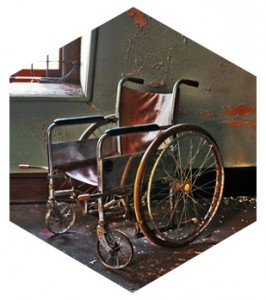 September 14, 2015
September 14, 2015
By Geoffrey Miller
Nobody wakes up in the morning and decides: “I think I will hate this group of people because they are weird and scary.”
Hatred is a much more subtle, insidious creature; through fear of impermanence, it crawls into the heart unseen.
Impermanence necessitates adaptation, painful self-exploration, discomfort, growth, pruning, and most importantly, shifts in power. Nobody ever wants to cede control to another. Impermanence kills who we once were and gives birth to who we will become. It destroys the world we know and cherish and builds up something novel and strange.
It is only natural to struggle against the death of personal identity and power, and thus it is only natural to hate that which threatens to alter us. This is why no one is immune to hatred. The Left, with all its thunderous noise about social justice and equality, is also familiar with hatred.
Many on the Left hate disabled people like me.
A basic tenet of the Left has been that personal identity and change should be embraced with pride. Disability challenges this tenet—it is hard to take pride in the fact that one cannot walk or swallow properly. Thus, many despise and ignore disabled people without questioning how such actions will affect their future; they do not realize that with increasing age, they too will likely become disabled. They simply do not want to be reminded of human suffering.
As a community, we have been struggling to fight for acceptance from the self-declaredly tolerant Left. Many liberals question why we were not aborted; as they want us out of sight and out of mind. The nicer ones want to “fix” us, and view us as broken human beings.
Yet it is the political systems that claim to support us which are broken.
Modern critical theory exalts the triad of race, class, and gender; yet somehow, disability is barely whispered. You will not see us featured in body positivity campaigns, nor do we offer the transgressive glamor of the LGBTQ movement. Some of us cannot even have sex, and that is just not sexy.
Are disabled individuals toxic? Would the Left prefer us to go away so it can get on with its new project of building a utopian paradise of political correctness? Do we want to live in a society where nobody has to think of something offensive or upsetting again?
When the Left does mention disability, it usually gets disguised under the cover of clever euphemisms: differently-abled, mentally challenged, etc. Otherwise, disability features as the butt of a cruel joke. Even President Obama has trouble respecting the disabled. On March 3, 2009, he casually revealed his disdain for disadvantaged children and adults when he denigrated his lack of skill at bowling, saying:
“It’s like — it was like Special Olympics, or something.”
We tolerate such this kind of thing a daily basis from people who should be our political allies. In recent years, we have watched some of our own disability advocacy groups split their efforts to back union campaigns and “anti-hate speech” crusades. We, the real victim class, are forgotten.
It is true that the disabled often serve as living, breathing symbols of death and diminishment. But this is not a bad thing. We are the ghosts of Christmas future, haunting an otherwise comfortable present. Like great art, we challenge and reshape those around us, usually for the better. People stare at us as one might stare at Michelangelo’s Last Judgment—we are beautiful, horrible glimpses of the inevitable.
But we are so much more than that.
We are testaments to the durability of the human spirit to survive adverse circumstances. We demonstrate that life is still worth living, and that even the powerless can attain joy and love.
We are people that you should get to know.

